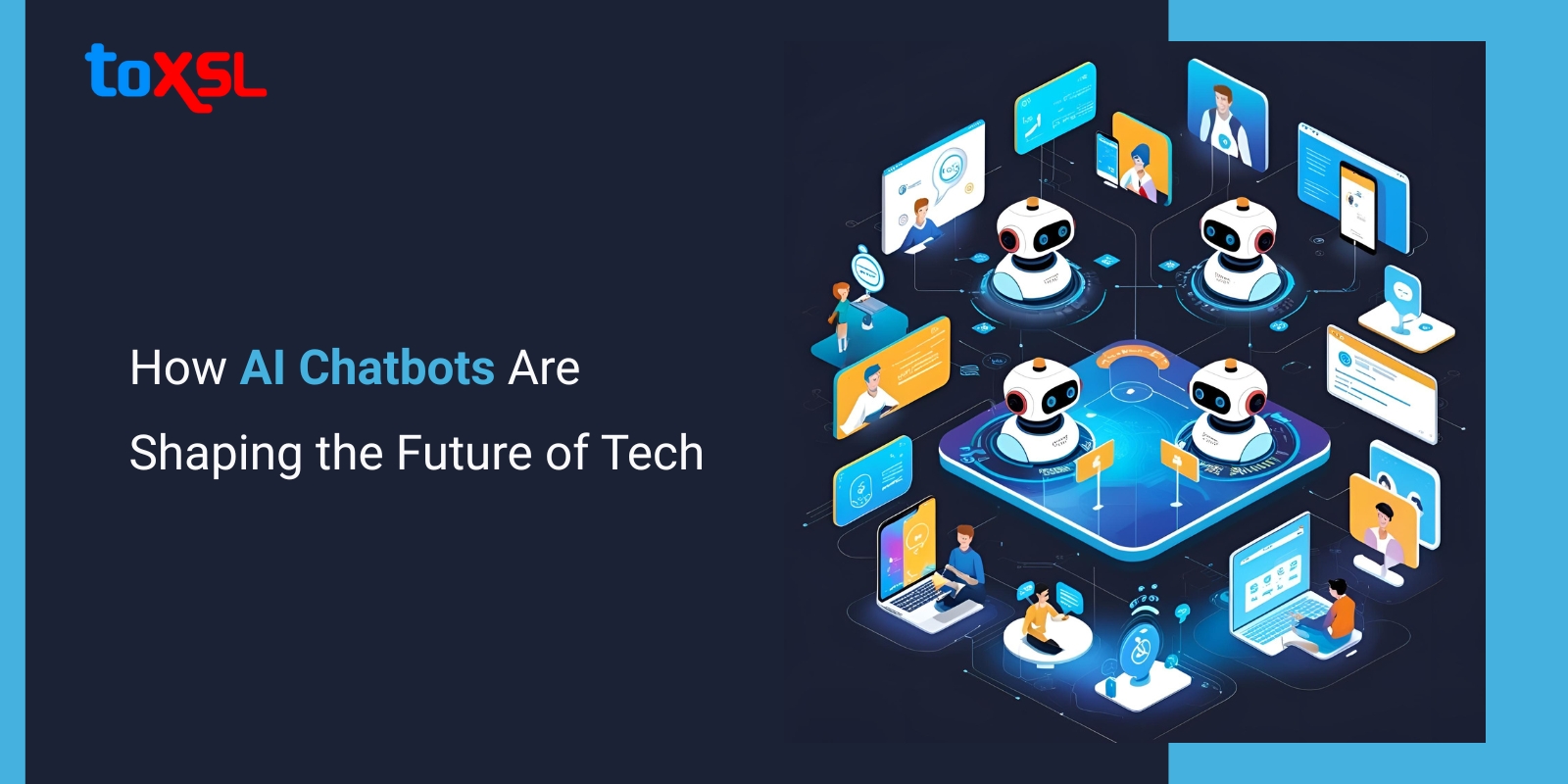- May 14, 2025
- Generative AI
- 1282
Share this post on:

Are you looking to redefine business with AI-powered chatbots? According to Straits Research, the chatbot market growth is expected to reach $3.62 billion by 2030. Chatbots are part of conversational artificial intelligence (AI) that communicate via messaging apps, websites, or mobile apps. In real-time, user interactions are handled by a rule-based language application that helps users follow rules to chat live.
Chatbots are easy to use and users do not necessarily have to download them. Also, they don’t demand any updates and remove the time barrier by replying to user’s queries on time. These chatbots use AI, machine learning, and natural language processing (NLP) to communicate with users by understanding context, interpreting intent, and generating human-like responses. These AI-powered chatbots give accurate customer support, facilitate sales, and streamline internal business processes.
Key Features of AI Chatbots
What features should businesses look for in an AI chatbot? After understanding how a chatbot works, it is time for businesses to choose the best customer service solution for your business. In this section, let us discuss the major features to consider while considering AI chatbot app development:
CRM Integration: Look for a chatbot that easily connects with your customer management system. This helps you fix problems quickly, take care of everyday tasks automatically, and give smart, personalized support in many languages using your customer information. When the chatbot is linked to your system, it’s also quicker and simpler to set up because the important data is already there.
Built-in Templates: A chatbot with built-in templates helps you get started quickly. These templates are ready-made for every day and special cases, so you can have your bot working in no time.
Omnichannel Capacity: The best way to help customers is to reach them wherever they prefer. A chatbot that works on websites, mobile apps, text messages, and other places can make your customer service better by being there to chat whenever your customers want.
Bot Analytics: Good AI chatbot tools give you reports and important stats to see how your bots are performing. By checking these numbers, chat details, and costs, you can track how well your bots are helping and make improvements to reach your customer goals. This data also helps you adjust your approach and make your bots better at understanding what customers need.
Benefits of AI-powered Chatbots in Business
AI chatbots play an important role in how businesses work. With smart technology, they can take care of complicated tasks automatically, saving both time and effort. They help improve customer support, boost sales and marketing, make daily work easier, create better experiences for users, provide useful insights, and much more. AI-powered chatbots handle tasks, make chats feel personal, and help manage resources. They have become an important part of the businesses that want to succeed in today’s digital world. Let’s explore how AI chatbots help in different parts of a business.
Customer Service and Support:AI chatbots are very beneficial in customer support because they offer fast support anytime, on any device. Experts say that through 2027, chatbots will be the main way by which businesses will help their clients. They can take care of lots of questions and requests all the time. Chatbots deliver quick solutions to common problems, reduce waiting times, and make customers feel satisfied. They're extraordinary at dealing with easy tasks like answering FAQs, sharing order updates, and guiding customers via smooth fixes. This frees up human agents to focus on more important work and saves time.
Improve Sales and Marketing: AI chatbots help a lot with sales and marketing. They talk to people visiting your website or app like a real person. They find good potential customers by using certain rules and collect their contact info, so sales teams can reach out later. Chatbots have friendly chats, share helpful information, and offer deals to encourage people to buy.
Enhanced Business Operations: Wouldn’t it be nice if your daily tasks got done by themselves? AI chatbots help make work easier by handling many routine jobs automatically. They can do things like entering data, creating reports, and organizing documents without you having to do it. They also help people inside the company communicate better. Chatbots share important info, arrange meetings, and send updates to everyone. This means less work for people and fewer errors.
Better User Experience: AI chatbots help make using websites and apps easier and better. They use smart tools to give help that fits what each person likes, what they did before, and some simple facts about them. Chatbots are always ready to help on websites, apps, social media, and chat apps. They also learn from talking with people and from what people say about them. This helps chatbots get better and give nicer answers over time.
Data Collection and Analysis: AI chatbots are good at gathering and understanding information. They use smart technology to look at data and find helpful insights. With this information, chatbots can guess what customers might need next and suggest solutions before problems happen. They also share useful details like how quickly they respond, how many people they talk to, and how happy customers are. This helps businesses make their chatbots work even better.
Cost Efficiency: AI chatbots assist businesses to work better and grow faster. They can communicate with many customers at the same time without increasing expenses. By doing routine tasks automatically, chatbots save time and reduce the need to hire more workforce for customer support and other jobs. While building a chatbot would possibly seem highly priced at first, it usually pays off by reducing expenses in support, marketing, and other areas, helping the enterprise earn more in the long run.
Following the Rules: AI chatbots are key for businesses that need to stay secure and meet legal requirements. Because they are able to update themselves with the modern-day information. Chatbots help organizations observe data protection legal guidelines like GDPR. To protect vital data from unauthorized access, chatbots use encryption and steady login methods. This allows groups to keep consumer statistics secure and guard consumer privacy effectively.
How Much Does it Cost to Build an AI Chatbot?
If you want a chatbot that uses artificial intelligence (AI) to talk with people, the cost can be different depending on what you need. Let’s see what affects the price and how much it might cost.
Basic Chatbots: Basic chatbots are simple. They follow fixed rules and answer easy questions. These chatbots usually cost between $5,000 and $15,000.
Smart AI Chatbots: Smart chatbots use AI to understand what people say and give better answers. These cost more, usually from $35,000 to $80,000.
Very Advanced Chatbots: The most advanced chatbots, which can talk like a human and use the latest AI, cost a lot more. They can cost from $80,000 to $250,000 or more.
What Changes the Price?
- How long did it take to build the chatbot?
- If the chatbot needs to connect with other apps or systems.
- Keeping the chatbot updated and working well costs extra each year.
- The location of the developers can change the price.
- Using AI services from companies like OpenAI may add monthly fees.
Why Is the Price Different?
Every chatbot is different. More features and special needs make it cost more. For example, a chatbot for a hospital is more expensive than one for a small shop.
Ways to Build a Chatbot
- Build it yourself if you have the skills.
- Hire a company that makes chatbots.
- Use chatbot platforms that are easier and cheaper to start with.
Final Words:
ToXSL Technologies is a leading Artificial Intelligence services provider company that help businesses drive growth and enhance their revenue. Our team of developers have helped numerous businesses with the most innovative and next-gen AI solutions. So, if you are looking to accelerate your business, AI is the capability to do so. Want to learn more? Contact us today.









